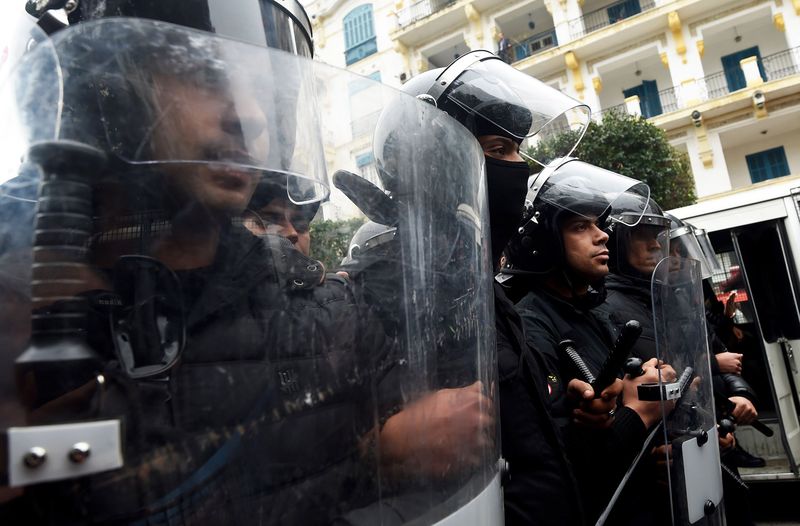
Tunisian police stand guard as citizens demonstrate in Tunis on Jan. 9, 2018.
Photographer: Fethi Belaid/AFP via Getty Images
Tunisia’s premier called for calm on Tuesday and promised that economic hardships would ease next year after the country’s main opposition party urged Tunisians to step up demonstrations against rising prices that have left one protester dead.
Hundreds of Tunisians poured into the center of the capital on Tuesday, a day after clashes with security forces in the nearby town of Teboura left one person dead and five wounded. Protests have erupted around Tunisia since the start of the year, when the government cut fuel subsidies and raised taxes in an effort to revive an economy that has faced repeated challenges since the 2011 ouster of President Zine El Abidine Ben Ali.
“The economic situation is difficult, but we must not exaggerate, and people must understand that the situation is exceptional and that their country is experiencing difficulties,” Prime Minister Youssef Chahed said in comments aired Tuesday by Radio Shams FM. “There are positive signs and the situation will improve,” he said, adding that 2018 will be the “last difficult year.”
Seven years since an uprising against political and economic injustices ousted Ben Ali and inspired a wave of revolts across the region, repeated strikes, political infighting and terrorist attacks have hammered the vital tourism sector and scared off foreign investment.
Tunisia secured a $2.9 billion International Monetary Fund loan in 2016, but that program is largely based on spending cuts, tax increases and subsidy reforms — unpopular measures in a country with a powerful union movement.
No Backing Down
Opposition groups have criticized the 2018 austerity budget passed by parliament late last year. They refused to back down as the tensions turned violent on Monday.
“We call on Tunisians to demonstrate peacefully in order to claim their legitimate rights in rejection of the procedures stipulated in the Finance Act of 2018,” Mongi Rahwi Said, a parliamentarian from the Popular Front, the country’s main opposition group, told Bloomberg by phone.
The budget is likely to add to the cost of living in Tunisia, where annual inflation reached 6.4 percent at the end of 2017, up from 4.2 percent a year earlier. The inflation rate is likely to accelerate further in the near term, as weakness in the dinar means imported goods will also cost more, according to a Nov. 28 Bloomberg Intelligence report.
Economic malaise has long been a flash-point in Tunisia, where youth unemployment is hovering above 25 percent and hopes that the 2011 revolt would bring a new era of prosperity have been dashed.
“These increases broke our backs. We are unable to save the bill of water and electricity with the cost of rent. This government policy is catastrophic and it has to change its policy and compassion toward the citizen, otherwise we will remain in the street,” said Mohamed Maalej, 36, who works as a driver.

